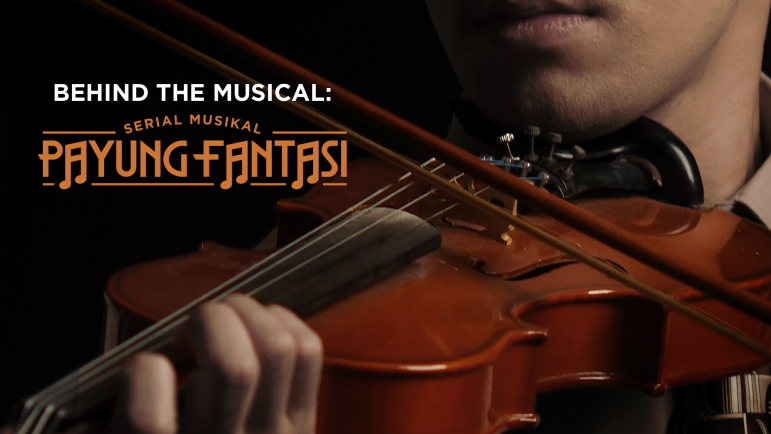For many Indonesians of a certain era, national heroes are often associated with stuffy textbooks and surprise history pop quizzes.
However, it’s true what they say about presentation, as many of Indonesia’s well-known figures led interesting lives that may not be reflected in academic textbooks.
In recent times, adaptations of the stories of Indonesian figures in movies and other forms of entertainment have become increasingly popular, allowing both young and old to experience their stories once again in fresh new takes, all the while providing historical insight.
One such adaptation is Payung Fantasi, which chronicles the life and times of composer, songwriter and musician Ismail Marzuki in a musical webseries format.
A joint production between Indonesia Kaya, Garin Nugroho and BOOW Live, Payung Fantasi draws inspiration from the Seabad Ismail Marzuki: Senandung Melintas Zaman (A Century of Ismail Marzuki: A Song Across Ages) biography by Ninok Leksono, where theater director Pasha Prakasa, film director Naya Anindita, music director Ivan Tangkulung and choreographer Ufa Sofura weaved the works and stories of Bang Maing, as Ismail is known, into a dynamic and enchanting musical.
Payung Fantasi, named after a song by Ismail Marzuki, is presented in six episodes that can be viewed for free on Indonesia Kaya’s YouTube channel. The series features more than 25 songs from the maestro’s repertoire, including “Rayuan Pulau Kelapa”, “Jauh di Mata” and “Sepasang Mata Bola”.
During an Instagram Live session with The Jakarta Post, Indonesia Kaya program manager Billy Gamaliel said the idea for free web musicals came during the COVID-19 pandemic.
While Indonesia Kaya regularly held theatrical performances prior to the pandemic, the situation forced stages to close down. The initiative, Billy explained, was a way for theater artists to stay productive.
Prior to Payung Fantasi, Indonesia Kaya engaged in other web-streamed theater productions, such as the #NontonTeaterDiRumahAja campaign, which streamed archival recordings of past productions and #MusikalDiRumahAja with modern twists injected into traditional folk tales.
One highlight is the 2021 Nurbaya musical series, an adaptation of the 1922 Sitti Nurbaya: Kasih Tak Sampai novel by Marah Rusli. With a total of six episodes, the series has received more than 21 million views on YouTube, which emboldened Indonesia Kaya’s efforts to produce more musicals.
“We were fascinated by Ismail Marzuki, as many are familiar with his works but not necessarily the man himself and his efforts in the run up to Indonesian independence. We also want the younger generation to know more about Ismail Marzuki and become even more interested in his works,” Billy said.
“Indonesia Kaya has always been supportive of the performing arts, as it can bring together various departments in the production, from the artists to the workers backstage. There are also a lot of cultural transmissions that occur – the cultural messages that can be conveyed – all in a form that is easily understood and accepted by its viewers.”
Payung Fantasi’s production began in January 2022 with an online audition titled “Mentjari Bang Maing dan Djoewita”, which received 250 entrants from across Indonesia. After a hybrid auditioning process, 29 cast members were selected.
Lead actor Gusty Pratama, who portrayed Ismail Marzuki in the series, said the audition tested actors on three skills: singing, dancing and acting. Someone who possessed all three, he continued, was known as a “triple threat”.
“I was very proud and elated when I got the role. I’m really thankful for the directors and everyone who entrusted me with the role of Ismail Marzuki to be reinterpreted with this body of mine,” he said.
For a young man living in the 2020s to suddenly portray someone living in the 1940s, and a national icon at that, is certainly quite a challenge. To get into character, Gusty buried himself in literature on Ismail Marzuki, both from biographies as well as original research undertaken as part of the production.
“To be honest, Ismail Marzuki’s audio and visual records are rather hard to come by, so we mostly got information through texts. One way I did that was by putting myself in Pak Ismail’s daily routine – he was an avid keroncong [Portuguese-influenced folk music] fan – so every morning I would try to go on about my day as Ismail Marzuki.”
From the way he walked to the way he talked, Gusty got so into the character that he even tried to visit Ismail Marzuki’s original residence, which had been turned into a boarding house. Even so, he still tried to find as much info as he could, including by posing as a university student looking to find lodging there just to get an understanding of the neighborhood.
“What I found most striking was his extraordinary love for Indonesia. He was someone who would put his own needs aside to focus on the people around him, for the country and for the people of Indonesia to become independent.”



